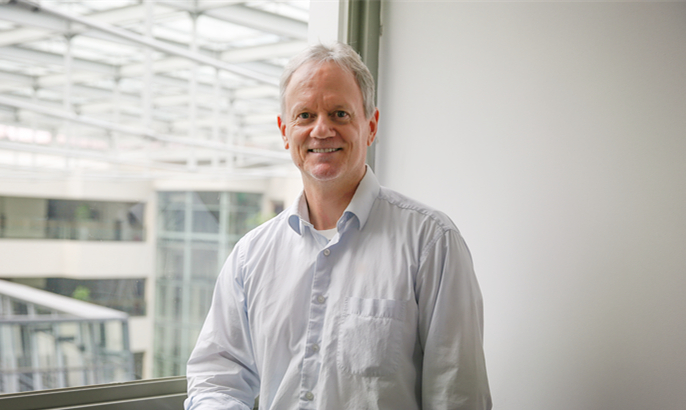Dr. Fritz Koger first came to PHBS six years ago, drawn to take a position on the faculty in the finance department by, in his words, “China’s growing prominence on the world’s stage.” The school’s location in Shenzhen proved to be icing on the cake, as Dr. Koger recognized the city’s “dynamic growth and increasing importance in China.”
Throughout his time at PHBS so far, Dr. Koger has observed firsthand the many changes that have come to the school since its inception. “The most obvious development is the increase in size,” Dr. Koger notes, as he estimates that the number of faculty members and students has tripled since he began teaching finance courses. “When I arrived, the school had zero international exchange programs for students. Now there are dozens,” he adds. He also emphasizes the increased number of academic conferences and seminars that take place in the new PHBS building.
As the professor of courses such Asset Valuation Theory and Financial Modeling, Dr. Koger often has the chance to gauge the ability of students studying finance at PHBS. When asked about his first impression of the school, Dr. Koger exclaims that the first answer to come to mind is definitely the technical competence of the students he instructs, noting that he adjusted his courses to be much more quantitative to keep ahead of the students and provide a rewarding and challenging learning environment. “I enjoy the challenge of challenging them,” he says, before adding, “It’s an honor to teach such talented students.”
In his courses, Dr. Koger strives to equip students with the tools necessary to excel at solving financial issues. “We emphasize analytical skills, as I want students to learn some finance,” he explains, “but more important is the ability to rigorously attack financial issues.”
Asset Valuation Theory provides the theoretical framework of such courses as financial economics, corporate finance, fixed income securities and derivatives. Financial Modeling, meanwhile, builds upon Asset Valuation Theory but emphasizes practical skills designed to translate into work environments that graduates will face, utilizing Microsoft Excel to “build models and implement sound modeling techniques.”

Outside of classes, Dr. Koger struggles to find time to get out of town too often, but appreciates the beauty of the campus during his walks in addition to the gym and the variety of dining options on campus. In general, he believes that “living in China is a fascinating experience for an American,” considering the stark cultural differences and endless learning opportunities.
“Similarly, as PHBS is relatively young, there are many differences compared to what I have experienced at older American schools,” he says. “As the school is young, there exist many opportunities to impact its direction, which has been fun.”
Dr. Koger’s most important piece of advice to students is simply to “Study hard! I know that I push my students very hard, but my goal is for them to learn as much as possible. Some may feel overwhelmed during the course, but many have told me afterwards how appreciative they are, which is very rewarding to me.” He also emphasizes the need to cultivate good habits, both in the classroom and out in the working world. “As our school’s mission is to develop future leaders of China and the world, I feel strongly that we need to practice habits exhibited by leaders, such as punctuality, respect, engagement, respect for deadlines and fairness.”
By Karras Lambert
















